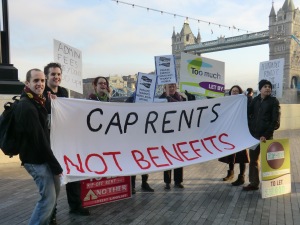So opposed were the Conservative members of the London Assembly’s Housing and Regeneration Committee to the modest recommendations of the committee’s recent report on ways of improving London’s dysfunctional private rented housing sector, they published their own report to explain why they refused to support them.
This handy guide helps you understand what they really mean…



Conservative members of the London Assembly’s Housing and Regeneration Committee.
They said: A.1 The GLA Conservative Members agree with much of what has been written in this report. However, there are several key issues where we disagree with the majority of the Committee. These are: rent control, compulsory registration of landlords, the Mayor’s London Rental Standard and retaliatory eviction.
They meant: We’ve not got the energy to argue with the overwhelming evidence that private renting in London is a total disaster for tenants. But we are not going to let you get away with recommendations that might actually improve things if enacted.
Rent control
A.2 In our view any artificial controls on rent in the private sector, either through traditional rent control or ‘rent stabilisation’ measures, would be an unwise and counter-productive policy that would ultimately lead to failure.
We are ideologically opposed to anything other than free markets. Rents must be allowed to rise unchecked, even as they push increasing proportions of London’s population into overcrowded housing, poverty or homelessness.
A.3 Artificial rent controls would deter this new investment in housing supply, including the institutional investment that we would all wish to see.
Actually, the market isn’t really delivering more housing. Even massive investors don’t want to build more homes. But claiming that stopping them charging unlimited rents would make them even less likely might help stave off attempts to bring in the type of measures that existing to control rents in most developed countries.
A.4 Rent control would also reduce the amount of money available to landlords to improve their properties and would therefore be likely to lead to reduced standards in rented properties.
Despite London rents rising at a rate far above wages and inflation, and only 4% of landlords raising rents due to increased costs, the reason landlords don’t do repairs is because they’re too poor.
A.5 Ultimately, whilst we understand why people would want to see artificial controls on rent, we believe that this would be a quick fix that would ultimately harm London’s housing market and reduce the supply of new homes.
Ultimately, whilst we understand why people would want something to be done about high rents, we’re afraid our opposition to anything which might damage landlords’ ability to profiteer means it’s tough.
Compulsory landlord registration
A.6 We would not support not support a compulsory blanket registration of landlords in London, as suggested by the other Committee Members. We believe that such a scheme would be impractical as it would focus resources on targeting good landlords rather than dealing with rogue landlords.
We’ve been convinced by big housing charities that the problem is limited to a handful of rogue landlords. Other landlords never do anything wrong and shouldn’t even have to let their local authority know that they exist, even if they’re receiving thousands of pounds of housing benefit.
A.7 It is unclear whether the Mayor or local authorities would be responsible for this. It would be much better for local authorities to focus on rigorously enforcing the existing regulations that they already have.
Since we haven’t decided who would carry out this yet, it can’t happen. Even though it would make it easier for local authorities to enforce existing regulation at a time when their budgets have been slashed.
London Rental Standard
A.8 We support the Mayor’s London Rental Standard as an important initiative and strongly feel that it should be given the chance to succeed. As the scheme is still being implemented, it is too early to judge whether or not the scheme has delivered a ‘step change’.
Even though Boris’ current approach to improving the private rented sector is business as usual so won’t result in any change, we think we can get away with doing nothing for a bit longer at least – and fully intend to.
A.9 A key concept of the London Rental Standard is to encourage landlords to voluntary(sic) sign up and improve their standards. The priority should be to maximise the number of landlords voluntarily signing up, resulting in more landlords adopting agreed standards and practices. Therefore, if at this point the standard is set so high as to put it out of the reach of many landlords, this will clearly be counter-productive to that aim.
A key concept in the London Rental Standard is to make the standards as weak as possible in an effort to get landlords to sign up to it. So we obviously can’t allow the standards to be raised above the current legal minimum.
A.10 We are also not persuaded of the merits of a single badge of accreditation. We are concerned that it would undermine the different accreditation schemes that exist in London at the very time that they need to be strengthened.
We are also not persuaded to support anything to make this accreditation scheme recognisable to tenants across London. We wouldn’t want it to actually work – bad landlords rely on tenants’ lack of information to rip them off.
Retaliatory eviction
A.11 We do not believe it is appropriate or helpful to call for the removal of “Section 21” eviction powers for landlords. There is a delicate balance to be struck between the rights of landlords and tenants, but we believe that landlords should ultimately have the right to reclaim the use of their own property. The problems in defining or establishing the existence of a “legitimate complaint” make this recommendation unworkable in practice.
We believe that landlords should ultimately have the right to evict their tenants for any reason. The landlord should certainly not have to show that the tenant had done something wrong – because then they couldn’t suddenly decide there was more money to be made from renting out a different property or to better-off tenants.
A.12 However, we would be happy to see a review of housing legislation to see if sensible safeguards can be introduced for tenants.
However, being seen to oppose efforts to stop retaliatory eviction doesn’t look good. The nasty party’s been rebranded, you know. So let’s say that we’d be OK with a junior civil servant looking at current legislation to check that tenants definitely don’t have any rights or safeguards when it comes to no-fault eviction (but don’t worry – we’re not actually going to ask for this review to happen).
The full minority report can be accessed on pages 47 and 48 of the committee’s main report, Rent Reforms.












